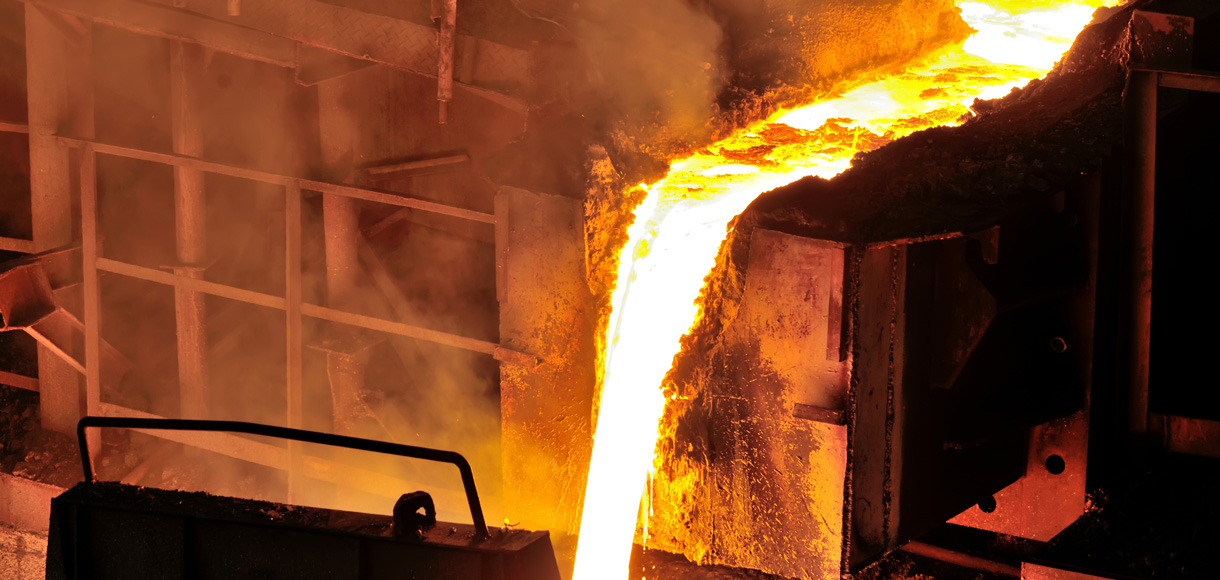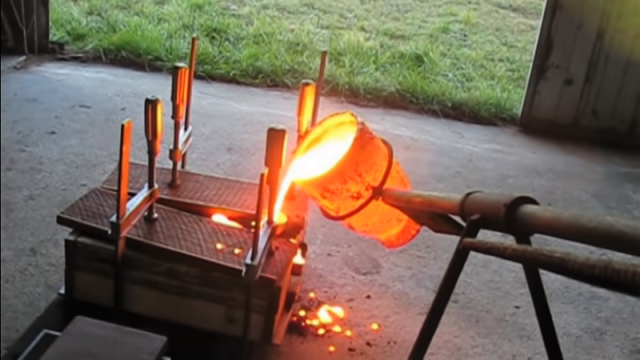The science and precision behind each Aluminum Casting application
A Deep Dive Into Steel Foundries: Secret Services and Their Influence On Manufacturing
Steel shops are integral to modern production, offering essential services that shape the manufacturing landscape. They specialize in different casting processes, guaranteeing accuracy and top quality in metal parts. The evolution of innovation and sustainable methods has actually further influenced their operations. As industries increasingly count on these factories, recognizing their key services and the effects for manufacturing efficiency ends up being vital. What innovations and difficulties lie ahead for this critical industry?
Recognizing Metal Casting Processes
Metal casting procedures transform liquid metal right into solid objects through numerous techniques, each tailored to certain applications and products. Among one of the most common methods are sand casting, investment spreading, and pass away spreading, each offering distinct benefits. Sand casting uses a mold and mildew made from sand, enabling the manufacturing of big components at a relatively inexpensive. Investment casting, on the other hand, involves developing a wax pattern that is coated in ceramic, generating complicated and extremely comprehensive forms. Pass away casting utilizes high stress to require liquified steel right into a mold, which is optimal for mass production of tiny, precise elements. These processes enable a vast array of steels to be utilized, consisting of steel, light weight aluminum, and bronze, fitting varied commercial requirements. The option of an ideal spreading method relies on elements such as required resistances, production quantity, and material residential or commercial properties, affecting the overall efficiency and effectiveness of the end items.
The Importance of Precision Spreading
Precision casting plays a necessary duty in generating parts that require high accuracy and elaborate details. This method, typically referred to as financial investment spreading, permits intricate geometries and limited resistances, making it essential in markets such as aerospace, automotive, and medical devices. By using wax patterns that are covered with a ceramic shell, accuracy spreading enables the creation of get rid of smooth surfaces and marginal finishing requirements.

Alloy Development and Product Option
In the domain name of metal foundries, alloy advancement and material option are vital variables influencing the performance and durability of actors parts. The option of alloy directly impacts mechanical residential properties, such as strength, rust, and ductility resistance, crucial for meeting particular application needs. Shops commonly take part in extensive research and screening to maximize alloy make-ups, tailoring them to the special demands of various sectors, including automobile, aerospace, and building and construction.
Product choice additionally involves examining aspects like expense, manufacturability, and accessibility, making sure that the picked alloy straightens with production capacities and spending plan restraints. Advanced simulation devices and analytical methods are used to anticipate the behavior of different alloys under varying problems, giving beneficial understandings for designers. Inevitably, efficient alloy development and product choice enable foundries to generate high-quality elements that improve operational efficiency and reliability in their intended applications.
Ingenious Molding Methods
Transforming the manufacturing process, ingenious molding methods play a critical function in improving the effectiveness and high quality of actors components in metal shops. Methods such as 3D printing and vacuum molding have actually arised as video game changers, permitting intricate designs and reduced lead times. These techniques allow factories to generate molds with complex geometries that typical techniques typically have a hard time to achieve.
In addition, the usage of advanced materials for mold and mildews, such as composite resins, enhances longevity and lowers wear, leading to longer manufacturing runs. Fast prototyping further enables fast iterations, helping with much faster advancement cycles and allowing makers to react more quickly to market needs.
Automation in molding procedures improves procedures, minimizing human error and enhancing throughput. By integrating these cutting-edge approaches, steel shops can enhance their production capacities, inevitably causing better spreadings and boosted general efficiency in the affordable manufacturing landscape.
High Quality Control in Metal Foundries
Quality control in metal factories is crucial for making certain the integrity and efficiency of actors items. It encompasses various assessment methods and requirements, in addition to flaw discovery approaches to determine possible problems early in the production process. In addition, robust quality control processes are essential for keeping uniformity and meeting sector demands.
Evaluation Techniques and Standards
Assuring the integrity of steel spreadings requires strenuous examination strategies and adherence to established criteria. Steel shops execute different inspection techniques to assess the quality of actors items, consisting of visual evaluations, dimensional checks, and non-destructive screening (NDT) These strategies assist to recognize possible issues early in the manufacturing process. Standards such as ASTM and ISO provide standards for appropriate high quality degrees and testing procedures, assuring that factories preserve regular high quality across their production lines. Compliance with these criteria not just boosts item reliability yet additionally fosters depend on amongst customers. By prioritizing inspection strategies, steel factories can reduce threats connected with defects and assurance that their castings satisfy consumer specifications and market demands.
Issue Detection Methods
Effective flaw detection approaches are essential to maintaining high standards in steel shops. These techniques encompass a variety of techniques targeted at identifying blemishes in spreadings prior to they are processed even more. Typical approaches include visual examination, which counts on the skilled eye of assessors to spot surface area flaws, and non-destructive testing (NDT) methods such as ultrasonic screening and radiography, which disclose internal problems without damaging the material. Furthermore, automated systems utilizing artificial intelligence and synthetic knowledge are significantly utilized to assess data and determine anomalies. Each technique plays an important role in guaranteeing the integrity of the end product, lessening waste, and improving general manufacturing performance. By carrying out robust defect discovery procedures, factories can promote their online reputation for quality.
Top Quality Assurance Processes
In metal factories, a comprehensive quality control procedure is necessary for creating dependable and high-performing castings. This process includes different stages, including resources assessment, in-process surveillance, and end product examination. By carrying out standard treatments, foundries can methodically determine and fix problems prior to they intensify into pricey issues. Advanced strategies, such as non-destructive screening and metallurgical evaluation, are used to examine the stability of castings. Moreover, documentation and traceability are critical elements, ensuring that each step of production satisfies stringent quality requirements. Educating workers in quality assurance practices even more enhances the efficiency of these processes. Inevitably, a robust quality guarantee framework not just improves functional effectiveness but also reinforces consumer trust and contentment in the shop's outcome.
The Duty of Technology in Factory Operations
Innovation revolutionizes factory operations by enhancing precision, efficiency, and safety and security. Automation plays a crucial duty, streamlining processes such as mold making and steel pouring, therefore lowering labor prices and reducing human mistake. Advanced computer-aided design (CAD) software allows precise modeling of parts, assisting in quicker adjustments and versions during manufacturing.
The integration of robotics in jobs like product handling and finishing procedures boosts productivity and guarantees constant quality. Real-time surveillance systems and information analytics provide useful insights into operational performance, permitting for timely interventions and maintenance, which ultimately extends tools life-span

The fostering of 3D printing technology further makes it possible for rapid prototyping and customized remedies, significantly decreasing preparations. In addition, sophisticated products technology improves the properties of alloys, enhancing casting efficiency. To sum up, technical developments are important in optimizing foundry operations, allowing producers to satisfy the boosting needs for top quality and efficiency in the affordable steel market.
Ecological Considerations in Metal Casting
Environmental considerations in metal spreading play a significant function fit industry practices. Effective waste monitoring, progressed exhaust control innovations, and using lasting materials are vital for decreasing the ecological impact of shops. Dealing Aluminum Foundry with these factors is crucial for promoting an extra sustainable future in steel production.

Waste Monitoring Practices
Reliable waste monitoring practices are essential in the metal casting sector to alleviate ecological impacts. Aluminum Casting. Factories create numerous kinds of waste, including steel sand, scrap, and chemical deposits. Implementing reusing programs enables for the repurposing of steel scrap, lowering the demand for virgin products and minimizing landfill payments. Furthermore, factories usually utilize sand recovery procedures, which recoup and reuse sand numerous times, consequently decreasing waste generation. Appropriate disposal techniques for dangerous materials, such as binding solvents and agents, are important to prevent dirt and water contamination. Moreover, staff member training on waste segregation and decrease methods can enhance total performance and sustainability. With these techniques, steel factories can considerably decrease their environmental footprint while keeping manufacturing efficiency
Exhaust Control Technologies
As the steel casting market evolves, the implementation of advanced discharge control innovations comes to be increasingly necessary for decreasing damaging contaminants released throughout production procedures. These modern technologies include different methods, consisting of electrostatic precipitators, scrubbers, and catalytic converters, which efficiently catch and reduce the effects of discharges prior to they enter the ambience. By incorporating such systems, shops can noticeably reduce particulate matter, unpredictable organic substances, and other unsafe emissions. Additionally, conformity with rigid environmental regulations not just minimizes eco-friendly effect yet likewise improves the sector's reputation and functional performance. The adoption of these technologies mirrors a commitment to lasting practices, ensuring that metal casting operations can fulfill the growing demand while prioritizing ecological wellness and security.
Sustainable Materials Use
Sustainable materials use in steel spreading plays a necessary role in decreasing the sector's eco-friendly impact. Foundries are increasingly taking on recycled steels, which greatly minimize the need for virgin resources and lower power consumption during the manufacturing process. Furthermore, the usage of environment-friendly binders and ingredients improves the sustainability of casting procedures by decreasing dangerous exhausts and waste. Technologies in material science likewise enable the growth of biodegradable options that do not jeopardize product quality. Shops are applying life-cycle analyses to review the ecological influence of products throughout their life expectancy, advertising more liable sourcing and use. On the whole, these practices add to a much more environmentally conscious and sustainable steel casting market, straightening with global initiatives to lower carbon impacts.
Regularly Asked Questions
What Are the Key Kind Of Metal Utilized in Foundries?
Factories mainly use metals such as iron, magnesium, aluminum, and copper. These products are selected for their special homes, which influence the spreading procedure and the performance features of the last products manufactured.
Just How Do Factories Make Sure Worker Safety And Security During Operations?
Shops assure worker safety and security with strenuous training, correct devices, ventilation systems, and adherence to safety and security guidelines. Normal assessments, personal safety gear, and emergency situation methods even more boost a safe workplace for workers participated in steel production.
What Is the Normal Preparation for Casting Production?
The regular preparation for spreading manufacturing varies, usually ranging from a couple of weeks to several months. Aspects influencing this timeline include intricacy of the style, material availability, and the shop's production ability and scheduling.
Exactly How Do Foundries Manage Waste and Recycling Processes?
Shops manage waste and recycling by applying procedures such as steel reclamation, sand recycling, and correct disposal of dangerous products, consequently minimizing environmental effect and promoting sustainability in their procedures while adhering to regulatory requirements.
What Industries Most Frequently Make Use Of Steel Factory Solutions?
Steel foundry solutions are primarily made use of in sectors such as automotive, equipment, aerospace, and building and construction production. These fields count on shops for generating cast steel elements essential for different applications and item development.
Steel factories are important to contemporary manufacturing, supplying crucial solutions that form the production landscape. Steel spreading procedures change fluid steel right into strong objects via numerous methods, each customized to details applications and materials. As innovation advances, the significance of precision spreading proceeds to expand, driving advancement and effectiveness in metal foundry procedures. Revolutionizing the production procedure, innovative molding techniques play a crucial duty in boosting the effectiveness and quality of actors parts in steel factories. In metal shops, a detailed top quality assurance procedure is necessary for generating high-performing and reputable castings.